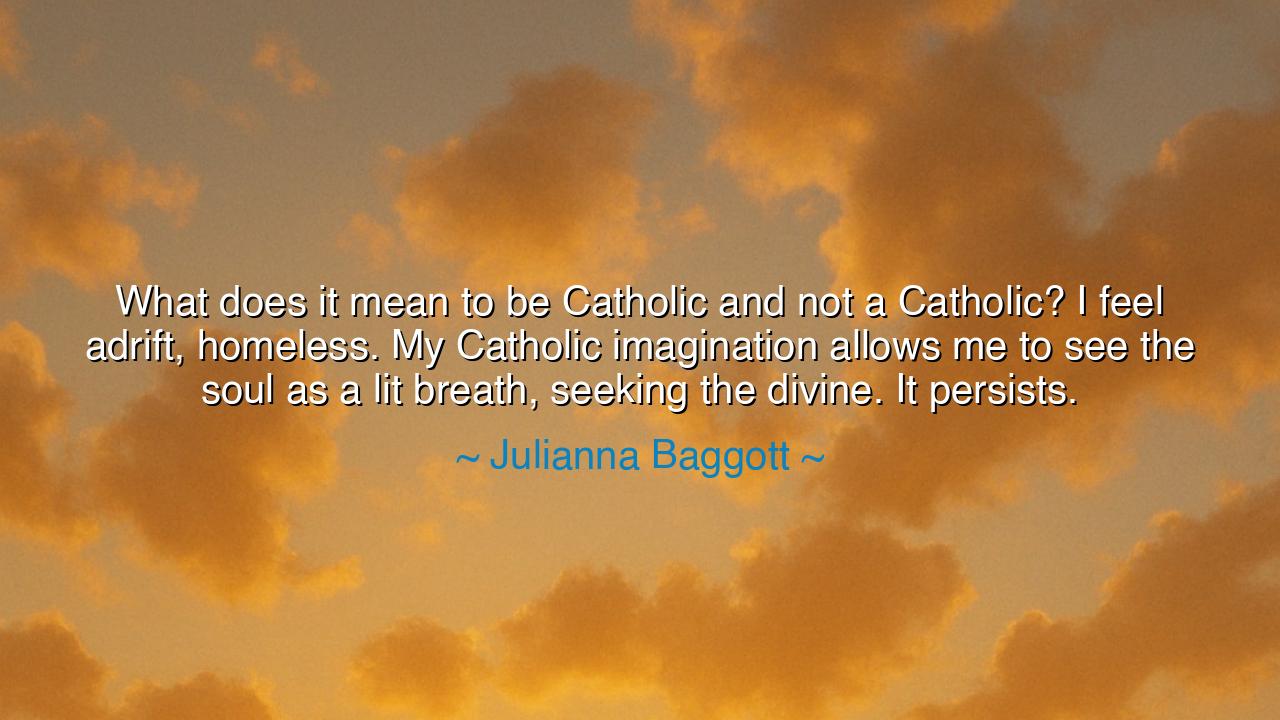
What does it mean to be Catholic and not a Catholic? I feel
What does it mean to be Catholic and not a Catholic? I feel adrift, homeless. My Catholic imagination allows me to see the soul as a lit breath, seeking the divine. It persists.






Listen, O seekers of wisdom, to the words of Julianna Baggott, for in them lies a profound question that has echoed through the ages: "What does it mean to be Catholic and not a Catholic?" These words are not mere musings but a deep cry from the soul of one who feels adrift, homeless, lost between worlds. To be Catholic and yet feel disconnected from the physical structure of faith—this is a dilemma that transcends the boundaries of mere religion. It speaks to the very essence of identity, of belonging, and of the struggle to find one’s place in a world that often demands conformity. Baggott’s words reflect the internal turmoil of one who has been shaped by faith, yet finds herself no longer at home within its walls.
What does it mean, then, to be Catholic without being bound by the formal practices of Catholicism? In this question, there is a paradox, a tension between the sacred and the secular, between the teachings of the Church and the soul’s search for the divine. Baggott speaks of the feeling of being adrift, of homelessness, not in the sense of lacking a physical place, but in the deeper sense of spiritual displacement. This is the struggle of the soul that has tasted the divine and yet finds itself estranged from the structures that once nourished it. Catholicism, with its rituals, its prayers, its saints, and its history, has shaped the soul in profound ways. Yet, when one steps away from it, as Baggott has, the soul is left to wander, seeking meaning in places where once it felt rooted.
In this state of spiritual homelessness, Baggott finds solace in what she calls her Catholic imagination. This is no mere memory of past rituals or doctrines; it is a living force, a way of seeing the world that transcends the boundaries of religious institutions. Her Catholic imagination allows her to perceive the soul as a lit breath, a flame that is always seeking, always reaching for the divine. The soul, in this view, is not static; it is in constant motion, ever yearning to return to the source of all things. Baggott sees the soul as a light, a breath that is always in search of something greater, something beyond itself. This is not a passive soul, content with its current state, but a soul that is alive with purpose, always moving towards the divine.
Consider, O wise ones, the ancient Greeks, who spoke of the soul as something that could not be contained by the physical body. In their mythology, the soul was often depicted as seeking reunion with the divine, much like a river that flows towards the ocean, never resting until it returns to the source. Plato, in his writings, spoke of the soul’s immortality and its quest for knowledge and truth. To the Greeks, the soul was never simply bound by the body or the material world; it was transcendent, seeking a higher truth that could only be found through wisdom, contemplation, and the search for the divine. Baggott’s description of the soul as a lit breath is in harmony with this ancient understanding: a soul that is alive, that is seeking, that is eternally reaching for something greater than itself.
Yet, even in this search, Baggott notes that the soul persists. This is a powerful word, a word that speaks of endurance, of resilience, of the unwavering drive of the soul to continue its journey, no matter the obstacles it faces. The soul, though it may wander, though it may feel lost or adrift, does not cease to seek. Persistence is the soul’s greatest gift, its most enduring trait. No matter how far it may stray from its source, it is always drawn back to the divine. Baggott’s words remind us that the soul is never truly lost, even when it feels disconnected. It persists, driven by an inner light, an inner truth that cannot be extinguished.
So, what lesson can we learn from this, O children of the future? The lesson is this: though we may feel adrift or homeless at times, though we may feel disconnected from the traditions and structures that once held us, the soul’s quest for the divine remains. Imagination, when it is rooted in something true and eternal, becomes a powerful force that can carry us through the darkest of times. Faith, even if it no longer resides within the walls of a particular church or belief system, can still shape the way we see the world, the way we approach the divine. Like Baggott, we must learn to trust the Catholic imagination within us, to allow it to guide us, to see our soul as a lit breath, ever reaching, ever seeking, ever persistent.
And what actions should you take, O seekers of truth? Do not despair in moments of disconnection. Understand that the search for the divine does not always require adherence to specific traditions or institutions. Your imagination, your soul, can lead you to that place of connection with the divine, regardless of where you find yourself. Trust the persistence of your soul, for it will always find its way home. Seek the divine in the world around you, in the light of your own inner being, in the quiet moments of your life. The divine is not confined to a place or a structure — it is within you, ever-present, ever-reaching.






AAdministratorAdministrator
Welcome, honored guests. Please leave a comment, we will respond soon